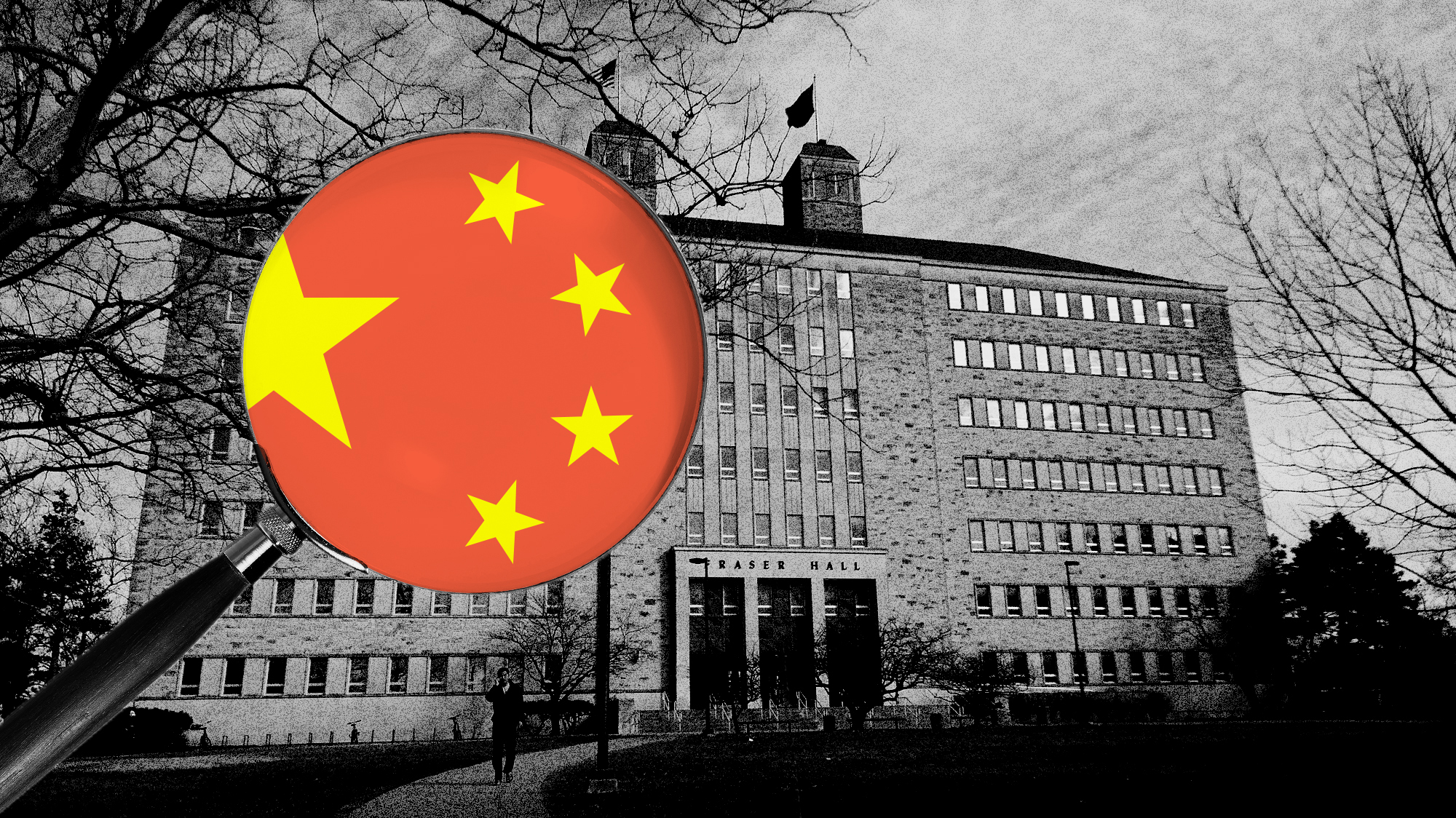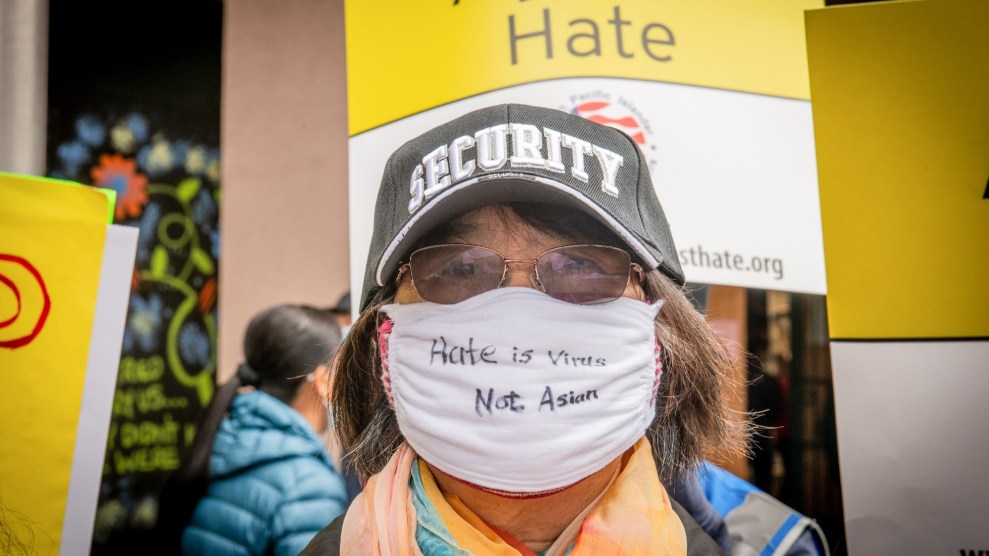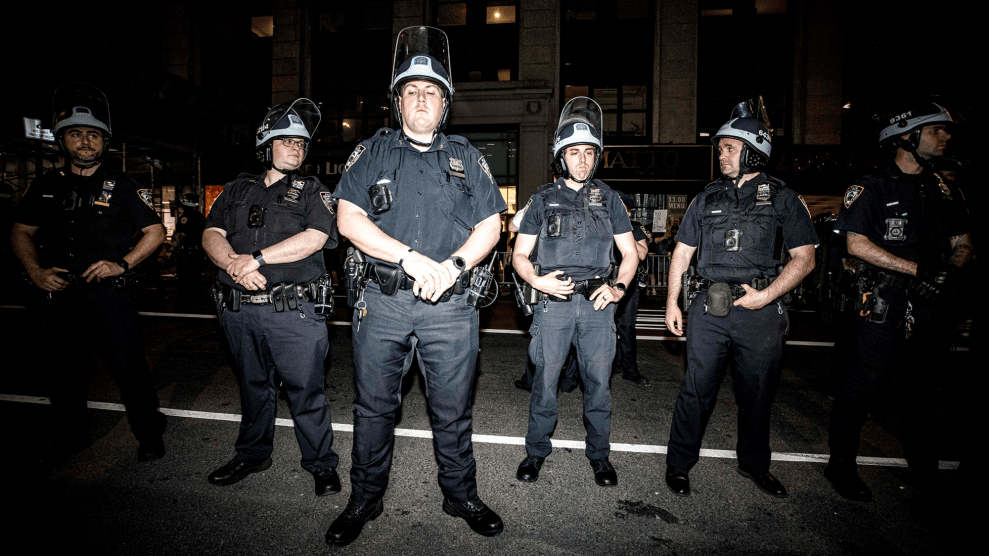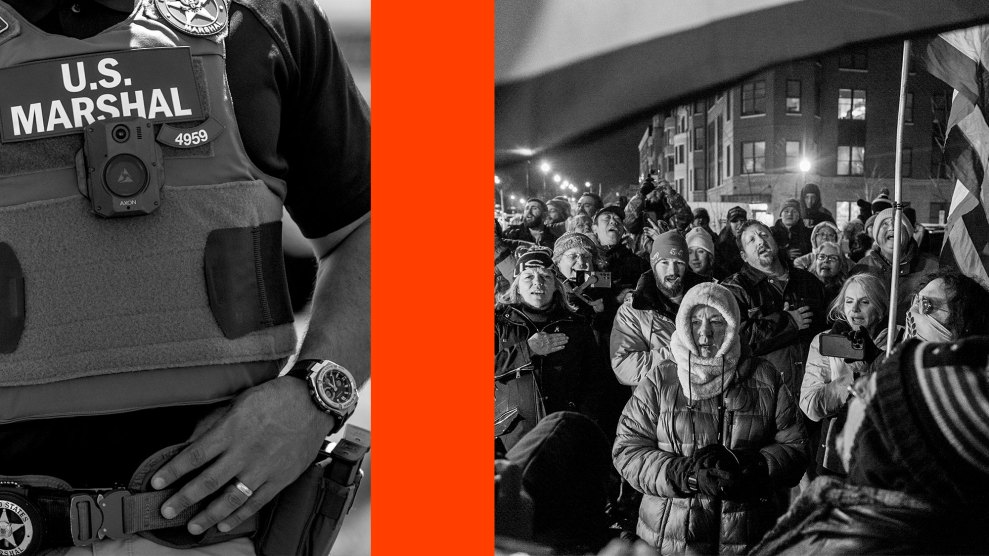In late August 2019, federal agents converged on a leafy cul-de-sac in Lawrence, Kansas, and arrested a chemical engineer named Feng “Franklin” Tao. His alleged crime? Working a second job in China while employed as a professor at the University of Kansas. He became the latest person of Chinese descent to be apprehended under a Trump-era program aimed at “countering Chinese national security threats,” particularly at research labs and universities.
Known as the China Initiative, the program was meant to target economic espionage and intellectual property theft. Tao, however, was charged with wire fraud and making false statements after he allegedly failed to disclose to the US government his position at Fuzhou University in China. The government argues that he defrauded federal science agencies out of grant money by not revealing his job in China, while advocates and his defense team say he’s the latest victim of a smear campaign that has intensified against the backdrop of rising tensions with China. If convicted, he faces up to 25 years in federal prison.
The Justice Department had requested a delayed start to Tao’s trial, which may keep him in legal limbo until early 2022. But late last week, his case faced an important crossroads: a hearing to determine whether to admit the DOJ’s best evidence—and an opportunity for Tao’s defense to question the FBI agent assigned to the case in a federal courthouse in Kansas City.
The hearing also provided a glimpse into the China Initiative itself. These cases are not James Bond thrillers, despite featuring key witnesses like an FBI counterintelligence agent and a historian who studies China’s effort to corrupt and subvert Western-style democracies. Most often, they center on whether professors like Tao correctly filled out conflict-of-interest forms. Of the roughly 80 cases pursued under the initiative, at least 18 of them involve university professors or researchers like Tao, only a handful of whom have been charged with stealing trade secrets or spying for China. Most of these defendants from academia were accused of some form of fraud or making false statements.
China in recent years has aggressively sought to upgrade its military and compete with the United States in science and technology. As part of that strategy, it has cultivated relationships with Chinese expatriates and other US-based scholars “to provide China with knowledge and intellectual capital in exchange for monetary gain and other benefits,” a bipartisan Senate report concluded in 2019. But Asian American activists and academics see the DOJ initiative as a heavy-handed and imprecise response to actual Chinese government malfeasance.
“Unfortunately, for those like Dr. Tao, the Government’s China Initiative casts an overly broad net, destroying the lives of many Chinese and Asian Americans and immigrants and spreading fear throughout the Asian American community,” read a brief submitted last year by several Asian American advocacy groups, including Asian Americans Advancing Justice. Since September 2020, prosecutors have dropped at least six China Initiative cases and courts have thrown two others out, amplifying the Asian American community’s concerns over government overreach.
Tao hopes his case reaches a similar outcome. After immigrating to the United States from China in 2002, he received a doctorate in chemistry at Princeton and went on to work at Notre Dame and the University of Kansas, studying sustainable technology and renewable energy. At Kansas, he worked at the Center for Environmentally Beneficial Catalysis and received grants from the US federal science agencies. He became a permanent resident and his wife, Hong, is now a US citizen. Their two children were both born in the United States.
The University of Kansas placed him on leave without pay, and two-plus years of legal fees have left his family “bankrupted financially,” according to a GoFundMe page set up by Hong and a family friend.
“We have been living constantly under a cloud of fear, afraid that we will lose the life that Franklin and I have worked so hard to build, Franklin’s freedom, and the future that we strove for our kids,” Hong wrote earlier this year on the couple’s fundraising site. “My husband is resolved to fight these felony charges to the end,” she added, “for him” and “all Chinese Americans.”
By the time Special Agent Stephen Lampe was called to testify last Thursday at the Robert J. Dole federal courthouse in Kansas City, Tao’s attorneys had already spent the morning arguing that the government, caught up in its effort to hunt down Chinese spies, had been sloppy and biased against Tao.
As the lead case agent, Lampe signed two affidavits for search warrants against Tao, which yielded the evidence used against him at trial, including purported emails from Tao to a Chinese university account, an unsigned contract with Fuzhou, and a photograph showing Tao with a Chinese Communist Party functionary. (His attorneys have not conceded that the email account belongs to Tao or that he is in the photograph.) But the two affidavits contain some contradictory details and, according to a motion filed by Tao’s attorneys in August, fail to include information that undercuts the credibility of Lampe’s key source.
“They were looking for a spy,” Tao’s attorney Peter Zeidenberg argued in Judge Julia Robinson’s fourth-floor courtroom. To cement the FBI’s case, agents like Lampe “ignored exculpatory evidence at every turn,” Zeidenberg said. “These weren’t random errors, but were tied together by a motivation.”
To Tao’s supporters, who sat a row behind me in the courtroom and who met him through the Lawrence Chinese Evangelical Church, it was clear what that motivation was. “One time in 2019, I went to Lawrence City Hall to renew my car license,” Jesse Song, a retired asset manager who organized the GoFundMe with Tao’s wife, told me. “A person came to me and said to me, ‘Do you work for CCP?’ I was really unhappy. Why does he think I work for the Chinese Communist Party? He knows nothing about me.” This moment, Song went on to elaborate, illustrated for him the animus facing scholars like Tao, who work under suspicion of dual loyalties for even associating with their home country.
Lampe was not an expert in grant fraud or academic misconduct, but rather counterintelligence. In May 2019, the FBI passed along several tips to Lampe that Tao was employed at Fuzhou while still working at Kansas. Some of the tips were anonymous, while others were signed with the names of Tao’s students or associates. But it quickly became clear that most, if not all, were sent by one woman, a research scholar whom DOJ referred to as “Student #1.” (The defense referred to her as “Government Informant” in its own filings, leading to a brief argument in court over what to actually call the researcher. Robinson preferred to stick with “Student #1.”)
During her stint at Kansas, the researcher had pushed Tao for more authorship credit on their published work and threatened to retaliate if her demands, which included greater compensation, were not met. “[W]hen anything that belongs to me is taken away, my counterattack will be very strong and very extreme,” she said in an April email to Tao. Two months later, she not-so-subtly told him, “[I]t seems that the term ‘tech spy’ is very popular nowadays.”
The disgruntled researcher escalated her campaign against Tao in May and June, using several fictitious email accounts to report him to the University of Kansas and the FBI. As evidence, she cited Chinese news articles that described Tao as a “Changjiang Scholar,” a prestigious award issued by the Chinese Ministry of Education. Few academics based outside of China have ever received the award, which is mostly reserved for domestic applicants, and for someone like Tao, it would have been a career-defining achievement. Tao’s lawyers acknowledge he was offered the award, but they say he never accepted it.
If Tao had accepted the prize and a corresponding position at a Chinese university without disclosing it to US grant administrators, it would pose legal concerns. He had received grants from the Energy Department and National Science Foundation, but he never cited an affiliation with a Chinese university. That alleged omission constituted fraud, the government said in its filings. From DOJ’s perspective, Tao would have been doing research for a Chinese university on the US government’s dime.
To collect evidence against Tao, Lampe relied on Student #1’s tips despite evidence that she had been misleading the FBI. After meeting with two FBI agents in July, she sent the agency an email acknowledging that she had “lied in some of the items” described in the interview, according to court filings. She admitted to using three different fake names to submit tips about Tao and falsely describing how she acquired the contract purportedly between Tao and Fuzhou. Originally, she said the contract came from Tao’s secretary. This time, she said she logged into his email account herself and downloaded it, court records show.
When questioned last week about Student #1’s credibility problems, Lampe struggled to disguise a feeling of suspicion. He insisted that she was still “reliable” because her claims had been backed up by other evidence and said her email, which detailed her own lies to the FBI, had been “clarifying.” But he also admitted to considering whether Student #1 should be charged with a crime and flailed in response to Zeidenberg’s heated questions about an error in the first affidavit.
Lampe filed the affidavit on July 11 for a warrant to search Tao’s email account. As evidence, it cited the unsigned contract found in Tao’s email, but bizarrely said Student #1 acquired it “with Tao’s permission and at Tao’s direction”—without explaining why Tao would willingly give a person threatening to report him access to evidence that could imprison him.
In a separate affidavit filed in August, Lampe corrected that initial account and said Student #1 provided the contract to the FBI “because she was angry with Tao over not crediting her on a published research article.” Tao’s attorneys seized on this addition as one of at least eight “knowing, intentional, or reckless misrepresentations and omissions” by Lampe, but Judge Robinson was not persuaded.
Student #1 “obviously was not credible on some issues,” Robinson said, but the affidavit was not based on her credibility. “It’s an affidavit based on information she was provided and then a lot of information” from other sources.
Tao’s attempt to suppress the evidence resulting from the FBI’s affidavits had failed.
If Thursday was a bad day for Tao’s defense, Friday went even worse.
His attorneys wanted to exclude testimony from government witness Glenn Tiffert, a research fellow at Stanford’s Hoover Institution, who would speak to the importance of Tao being photographed with a Communist Party official and contextualize the Changjiang Scholars program for the jury. Tao’s defense team viewed Tiffert’s testimony as a way to introduce the paranoia and international gamesmanship of an espionage case, even though Tao was being charged with fraud. (Their concern wasn’t unfounded: Over the weekend, Tao’s wife shared with me a brief news report from Kansas’ public radio affiliate that incorrectly said Tao was accused of being “a spy who stole intellectual property.”)
Judge Robinson spoke during the hearing of not wanting to put “China on trial,” but from the advent of the China Initiative, it’s been hard to ignore the increasingly strained relationship between the United States and China. The only signature bipartisan piece of legislation to reach Joe Biden’s desk this year was a bill targeting China and, in many ways, Biden has continued the trade war that Donald Trump started. His administration’s focus on China is not as overtly racist as Trump’s—no Biden official is calling the coronavirus “kung flu”—but it has startled Asian American advocacy groups to the point where a coalition of them have urged Biden to tone it down.
In July, 90 lawmakers led by Rep. Ted Lieu (D-Calif.) wrote to Attorney General Merrick Garland, urging him to investigate the “repeated, wrongful targeting of individuals of Asian descent for alleged espionage.” “Over the years, multiple people who happened to be of Asian descent have been falsely accused by the Department of Justice of espionage,” the lawmakers wrote. “The common thread in every one of these cases was a defendant with an Asian surname—and an innocent life that was turned upside down.”
The DOJ did not respond to a request for comment, but last month department spokesperson Wyn Hornbuckle told the Washington Post that the department “is dedicated to countering unlawful PRC government efforts to undermine America’s national security and harm our economy” while “also mindful of our responsibility to combat another serious threat: the substantial rise in hate crimes and bias targeting the Asian American Pacific Islander community.”
Tao, who barely budged during Lampe’s testimony, seemed far more bothered by Tiffert’s turn on the stand. When Tiffert described an application in which Tao allegedly outlined his fitness for a Chinese scholarship, Tao angrily shook his head. Later, when the hearing was briefly out of session, Tiffert informally translated the name of a Chinese program and Tao stood up and declared that the translation was wrong, drawing a reprimand from his own attorney.
Tiffert was not even DOJ’s first—or most controversial—choice of expert witness. In August 2020, the prosecution announced its plan to introduce Robert Spalding, a retired Air Force brigadier general and former Trump National Security Council official who has floated evidence-free claims about Chinese interference in the 2020 election and served on the board of a Steve Bannon-led group that aimed to raise money to build a wall on the southern US border. (Bannon was charged with fraud as part of that scheme, but Trump pardoned him.) Imagine the irony of a government witness in a fraud case being someone who, only months earlier, had served on the board of what DOJ itself said was a scheme to defraud donors.
Two days after Biden took office, the DOJ withdrew its plan to call Spalding as a witness. But the selection of Tiffert as a replacement invited its own problems, which Tao’s attorneys took pains to outline in court. Earlier this year, Tiffert had been called as an expert in a different China Initiative case involving a UCLA researcher who had been accused of concealing his affiliation with the Chinese military. After originally suggesting the defendant had likely ties to the military, Tiffert changed his opinion once new evidence emerged. The case was eventually dropped. (When asked to comment for this article, Tiffert said, “I have nothing to add beyond what I said on the stand last Friday.”)
Robinson did not seem bothered by Tiffert’s shift in that case, noting that it showed he was not some “hired gun” for the prosecution. She rejected Tao’s request to block him as a witness, completing a clean sweep of defeats for the defense as the second and final day of the hearing concluded. As Zeidenberg pressed her for more context, Robinson shut down further conversation. “When I rule, I rule,” she said.
Robinson also agreed to extend the start of the trial again, citing problems the DOJ was having with getting its Chinese-language documents translated. No trial date has been set yet, but prosecutors indicated that they want it to start in 2022 and expect to take at least three weeks to present their case.
In several other major China Initiative cases, the targeted professor has received support from their host university or at least their colleagues.
After MIT scientist Gang Chen was charged with grant fraud in January for failing to disclose ties to the Chinese government, nearly 200 of his colleagues signed an open letter condemning the investigation as “deeply flawed.” In September, 177 Stanford professors called on Garland to end the China Initiative, garnering similar commitments from faculty at Temple University and the University of California, Berkeley.
Tao has not enjoyed that level of support. Outside of some help from his church and family friends and support from Asian American affinity groups, he has had to face down the government alone. Not only has the University of Kansas declined to support him, but several of his former colleagues also agreed to testify against him, including his former department chair.
The ordeal has not been kind to Tao or his two children, but when I spoke to his wife last week, she expressed a quiet confidence. “Yesterday, I went home and cried,” she told me. “Sometimes you have to do that. But I try to stay very strong.”
As dreary as the proceedings were, she maintained a sunny demeanor, repeatedly offering me snacks as different friends—almost all from church—filed in and spoke to her during breaks. For them, this process was not just about Franklin, but something more. “The US government comes and goes, but the law stands firm,” Song told me. “The law protects every US citizen. It has to be just and firm.”













